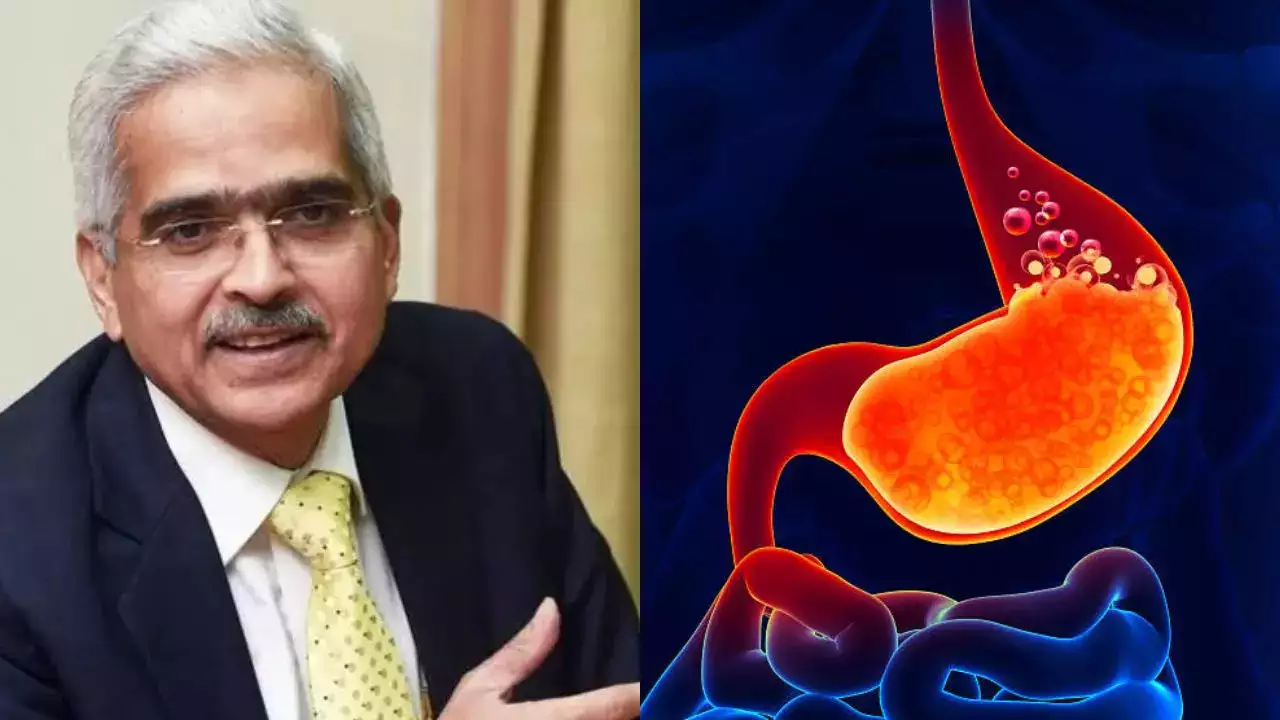
Doctors say when acid creeps into places it does not belong, you are bound to feel it, as it causes irritation and inflammation of the tissues inside your esophagus
The governor of the Reserve Bank of India (RBI) Shaktikanta Das was hospitalized in Chennai after suffering extreme acidity. “He is now doing fine and will be discharged in the next 2-3 hours,” an RBI spokesperson was quoted by ANI.
“There is no cause for concern.”
What is acid reflux?
After you eat food if the acid from inside your stomach flows backward — meaning, up — into your esophagus and throat, it is known as acid reflux. Doctors say when acid creeps into places it does not belong, you are bound to feel it, as it causes irritation and inflammation of the tissues inside your esophagus, which runs from your stomach up through your chest to your throat.
While it is common to experience an occasional episode of acid reflux, it may feel like indigestion, burning stomach pain after eating, heartburn, chest pain, bad throat, bad breath, and nausea.
Is acid reflux dangerous?
According to doctors, even though acid reflux is not a life-threatening condition, frequent acid reflux, or gastroesophageal reflux disease (GERD), can lead to more serious health issues and complications if left untreated.
A few serious issues - especially if they are left untreated can cause complications like:
Ulcers
Doctors say stomach acid can damage the lining of the esophagus, leading to a painful ulcer, or open sore known as esophageal ulcer. It causes a burning sensation in your chest area, recurrent indigestion, pain when swallowing, nausea, and heartburn.
If left untreated, an esophageal ulcer can lead to more serious complications like perforation in the esophagus and bleeding.
Stricture
Over time, inflammation from GERD in the esophagus leads to scarring or abnormal tissue growth. Also known as esophageal stricture, the condition makes your esophagus narrower and tighter making swallowing anything extremely difficult and causing breathlessness.
Solid or dense foods can also get lodged in the esophagus, increasing your risk of choking.
Aspirational pneumonia
Repeatedly inhaling stomach acid that rises to your throat or mouth into your lungs can cause aspirational pneumonia, a severe lung infection that causes symptoms of fever, deep cough, chest pain, breathlessness, wheezing, and fatigue.
According to doctors, aspiration pneumonia can be serious and even fatal if left untreated.
Cancer
Those who have GERD are also at an increased risk of adenocarcinoma of the esophagus - a type of esophageal cancer, which affects the lower part of the esophagus, causing symptoms like difficulty swallowing, extreme weight loss, chest pain, cough, indigestion, and severe heartburn.
Doctors say esophageal cancer does not cause any symptoms in its early stages and can only be noticed once the cancer has reached a more advanced stage.
How to prevent complications from acid reflux?
Doctors say you may be able to reduce acid reflux and prevent many complications by:
Avoiding certain foods
Avoid eating fried, greasy, fatty, and spicy foods which can cause acid reflux and stomach pain.
Changing eating habits
Many habits like not eating at a stretch or going to bed just after eating can cause acid reflux. Doctors advise giving your stomach time to digest the food that you have eaten.
Losing weight
Being obese or having a pot belly can push your stomach upward, making it easier for acid to rise into your esophagus.
Limiting alcohol and caffeine
Both excessive caffeine and alcohol can lead to acid reflux which causes indigestion.
Quit smoking
Smoking makes it difficult for the sphincter that separates your esophagus from your stomach to close properly after food enters your stomach.
Wear loose clothing
Tight-fitting clothes, especially around your belly can put additional pressure on your abdomen, forcing the contents of your stomach upward.
Get Latest News Live on Times Now along with Breaking News and Top Headlines from Health and around the world.